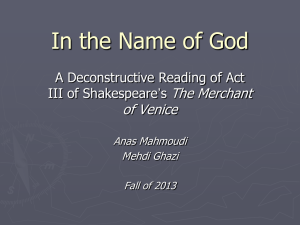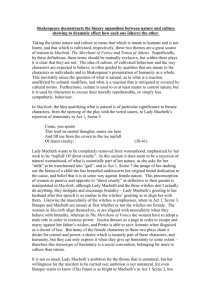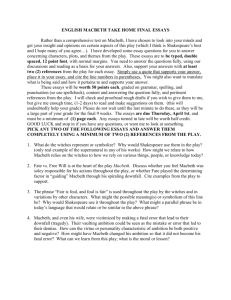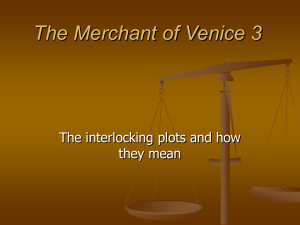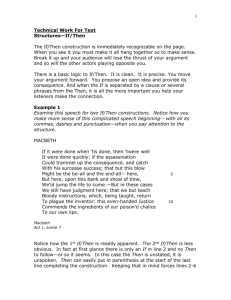Ambition and aspiration within Macbeth, The
advertisement
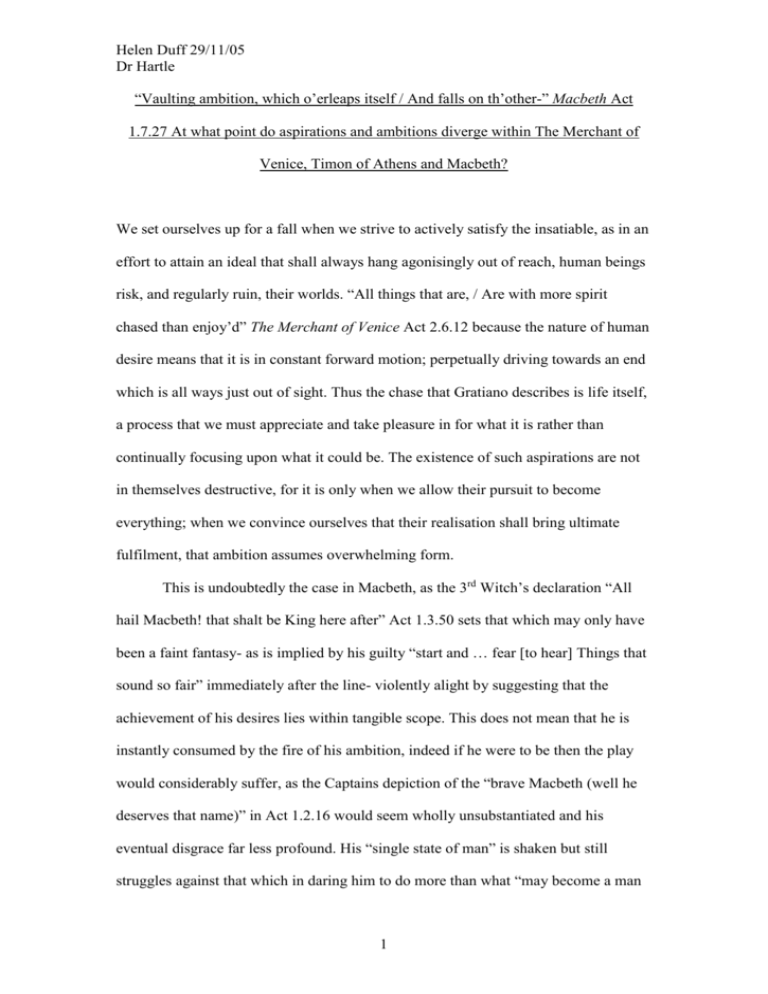
Helen Duff 29/11/05 Dr Hartle “Vaulting ambition, which o’erleaps itself / And falls on th’other-” Macbeth Act 1.7.27 At what point do aspirations and ambitions diverge within The Merchant of Venice, Timon of Athens and Macbeth? We set ourselves up for a fall when we strive to actively satisfy the insatiable, as in an effort to attain an ideal that shall always hang agonisingly out of reach, human beings risk, and regularly ruin, their worlds. “All things that are, / Are with more spirit chased than enjoy’d” The Merchant of Venice Act 2.6.12 because the nature of human desire means that it is in constant forward motion; perpetually driving towards an end which is all ways just out of sight. Thus the chase that Gratiano describes is life itself, a process that we must appreciate and take pleasure in for what it is rather than continually focusing upon what it could be. The existence of such aspirations are not in themselves destructive, for it is only when we allow their pursuit to become everything; when we convince ourselves that their realisation shall bring ultimate fulfilment, that ambition assumes overwhelming form. This is undoubtedly the case in Macbeth, as the 3rd Witch’s declaration “All hail Macbeth! that shalt be King here after” Act 1.3.50 sets that which may only have been a faint fantasy- as is implied by his guilty “start and … fear [to hear] Things that sound so fair” immediately after the line- violently alight by suggesting that the achievement of his desires lies within tangible scope. This does not mean that he is instantly consumed by the fire of his ambition, indeed if he were to be then the play would considerably suffer, as the Captains depiction of the “brave Macbeth (well he deserves that name)” in Act 1.2.16 would seem wholly unsubstantiated and his eventual disgrace far less profound. His “single state of man” is shaken but still struggles against that which in daring him to do more than what “may become a man 1 Helen Duff 29/11/05 Dr Hartle [would render him] none.” Act 1.7.40; eradicating rather than elevating his presence because it pushes him to go against the fundamental substance of what he shall always be. Unfortunately for Macbeth, this sense of self is not strong enough to survive the flames once they have been fuelled by, and fused with, the raging desires of his wife, a women who has been “transported…beyond this ignorant present” by his letter and, we feel, carried away by the ferocious current of possibilities that the Witches promises portend. Along the way her eyes have been opened to the fact that her husband “wouldst be great; Art not without ambition, but without / The illness should attend it” Act 1.5.17; a contamination of the will which causes it to relentlessly want more, whatever the cost, and which she is determined to pour like pestilence into his ear. At this moment we see her become the very spirit of ambition, deliberately inviting the “murth’ring ministers” of evil to take full possession of her being and “stop up the th’access and passage to remorse” within her by filling her “from the crown to the toe, top-full of direst cruelty!” Act 1.5.41. It is an obviously unbalanced image, the weight of the crown already hanging like a heavy burden upon a head that perennially threatens to spill the uncontainable evil it holds within (as is revealed when she exposes all in the subconscious oblivion of sleep). It also forces us to realise, if the fact that the sources of temptation “look not like th’inhabitants o’th’earth” Act 1.3.41 hadn’t already made clear, how intensely unnatural a process sacrificing yourself to ambition may be, as she feels compelled to divest herself of all compassion, to become something “unsex[ed]” and effectively inhuman in order to realise her “fell purpose”. For Lady Macbeth it is a transformation which she consciously embraces however, as she desperately seizes what she sees as the only means to escape her painfully inadequate female form- a body which has “given suck 2 Helen Duff 29/11/05 Dr Hartle [but was unable to sustain] the babe that” milked it Act 1.7.54 and later fails to commit Duncan’s killing because he so “resembled [her] father as he slept” Act 2.2.12. Thus we realise that she is not drawn forward by what lies ahead, but pushed there by the terrible disappointments behind; gaping, possibly child shaped holes that shall never be filled by empty honours, especially since they have been snatched from a sleeping monarch rather than earned like stars of nobleness that “shine [unprompted] on all deservers”Act1.4.41. Not a healthy extension of your existence but a deliberate detachment from the life that has previously let you down, or indeed an active attack upon it, the ambitious cycle “o’erleaps itself” because it refuses to settle for this self alone. Thus Portia cannot simply accept that her marriage to Bassanio has sealed her position as “Queen o’er myself: and even now but now” in Act 3.2.169 of The Merchant of Venice; she must actively “outface [her husband] and outswear [him] too” Act 4.2.17. Bassanio does not question her intelligence or undermine her status, indeed he even appeals for her leave to “bid my very friends and countrymen / (Sweet Portia) welcome” in Act 3.2.221, yet she still feels compelled to vent her insecurities upon him, to ensure that she is never imprisoned in a position where “she may neither choose who [she] would, nor refuse who [she] dislike”s Act 1.2.22 again. Pushing Bassanio to give her the ring achieves nothing but disillusion for each party involved- his weakness may superficially strengthen Portia’s role but she is held up at the expense of Bassanio’s tested and tarnished devotion. If left unquestioned, this loyalty had the potential to keep their relationship in a state of secure, natural balance, as we should not forget that it was Bassanio’s acknowledgement that “ornament is but the guiled shore / To a most dangerous sea” 3 Helen Duff 29/11/05 Dr Hartle Act 3.2.96; his innate respect for inner integrity, which allowed the pair to be bought together in the first place. Portia’s need to assert herself after years of oppression under “the will of a dead father” means that such an option is never really open however, as we feel that even if Bassanio refused to surrender to the heavily persuasive argument she employs in Act 4.2-an extremely odd moment where she speaks against herself “if your wife be not a mad-woman …She would not hold out enemy forever / For giving it to me” Act 4.2.441 and so effectively engineers her own disenchantment- she would push him forever and still not be satisfied. Her remarks to Nerissa seem to suggest that she sees all men as “bragging Jacks” Act 3.5.77 that cannot be trusted, an attitude further reflected by her contempt of the suitor that at his best is “little worse than a man, and [at his] worse is a little better than a beast” Act 1.2.83. Thus her drive to have her superiority over them recognised- most obviously achieved when the praise of Lorenzo “you drop manna in the way/ Of starved people” Act 5.1.294 lifts her to the level of the divine- may be seen as a means to redress all that she has made her “little body aweary [in] this great world” Act 1.2.1 The connections that may consequently be forged between Portia and Shylock, a man who hates Antonio because “he is a Christian” and therefore provides fuel to “feed fat the ancient grudge [Shylock bears] him” Act 1.3.36, are particularly interesting, especially when their ambitions come into direct conflict. Both characters seek retribution for suffering which reaches far beyond their own experience and therefore neither one can truly reconcile themselves to what they have in the moment. Portia uses her higher power to play upon this common weakness in the court scene, deliberately making Shylock believe that he can have it all (whatever that really means) and in many ways keeping to her word as she forces “justice more than thou 4 Helen Duff 29/11/05 Dr Hartle desir’st” Act 4.1.312 down his throat. Shylock is devastated, given the choice to answer “I am content” to have “lost the means by which I live” or to actually lose his life, his ambition is left utterly unrequited, with no money, flesh or Christian pain to pay for the wrongs that he feels he and his people, who wear “sufferance [as] the badge of all [their] tribe” Act 1.3105, have endured. To an equal and opposite degree Portia is elevated by his sentence, as in a direct inversion of their “lawful” commitment to Shylock only moments before, Antonio declares that he and Bassanio “stand indebted over and above / In love and service to [her] evermore” Act 4.1.409 and she subsequently finds herself both “well paid [and] well satisfied”. Thus the exchange captures one of the basic conditions of ambition- an idea first expressed within the second scene of Macbeth when Duncan instructs Rosse to “Go pronounce [the Thane of Cawdor’s] present death / And with his former title greet Macbeth” Act 1.2.66 and even more clearly expounded when Macbeth refers to Duncan as he “Whom we, to gain our peace, have sent to peace” Act 3.2.20- in order for one to rise, another must fall. It is a core principal that governs Shakespeare’s exploration of ambition as even in King Henry IV part 1, “one England [cannot] brook a double reign / Of Harry Percy and the Prince of Wales” Act 5.4.65; it must be either or. This does not mean that Shylock is cast as the ultimate victim at the end of Act 4.1- although the audience must feel some pity for the single Jew who faces a mass of hypocritical Christians- as he craves Antonio’s flesh like a cannibal because “if it will feed nothing else, it will feed my revenge” Act 3.1.46 and refuses to call a surgeon to “To stop his wounds lest he do bleed to death” Act 4.1.254 because the condition is not “nominated in the bond”. In the same respect Portia uses the bond’s omission of the blood clause to threaten Shylock with death if “the scale of [Antonio’s division] do turn / But in the estimation of a hair” Act 4.1.326 and it is only because the Duke 5 Helen Duff 29/11/05 Dr Hartle pardons Shylock’s life that any mercy is shown at all (although even this compassion is questioned when Shylock suggests that extending his life yet taking the “means by which [he] lives” is greater torture than simply ending it). Shylocks treatment of Jessica, whose elopement causes him to wish “ she were hears’d at [his] foot and the ducats in her coffin” Act 3.1.81, suggests his anger does not discriminate between the sexes; if the situation were reversed he would undoubtedly exploit his position as Portia does. Thus we are led to believe that she has simply beaten him at an ambitious game in which he has wilfully engaged, a game that if Timon of Athens is to be believed, the entire natural world is perennially playing. For once he has professed himself a misanthrope, Timon’s abhorrence of mankind reaches such a height that he can no longer differentiate between the cycles of all consuming ambition and life itself; “beastly ambition” becoming the very purpose of an empty existence that “the gods grant thee t’attain to” Act 4.3.327. If man chooses to live such a life, as it seems it is impossible not to do unless you embrace banishment from society, he has no choice but to become a “most smiling, smooth, detested parasite” Act 3.6.90; the idea that he should not feed upon those above him made almost unnatural when at the end of a comprehensive list of examples, Timon asks: “What beast could thou be that were not subject to a beast?” Act 4.3.344. Timon’s loathing of mankind means that his views represent the absolute extreme- as is exemplified by his loyal Steward who “so true, so just…almost turns [Timon’s] dangerous mind” and though eventually classed as the exception by his master; the one “singly honest man” that exists, works to give the audience hope for humanity in what is an other wise terribly bleak world. The level of general desolation does force us to appreciate Timon’s sentiments however, especially when we are begged to “Believe’t that we’ll do anything for gold” Act 4.3.152 by Phrynia and 6 Helen Duff 29/11/05 Dr Hartle Timandra and are sorely reminded of Lady Macbeth’s shocking suggestion that she “would while [her child] was smiling in [her] face / Have plucked my nipple from his boneless gums, / And dash’d the brains out, had I so sworn / As you have done to this” Act 1.7.56. The fact that she lacks the brutality to follow through her words, unable to kill Duncan because he connects to emotions within her that she cannot ignore, allows us to draw some comfort from what would otherwise show humanity at its most horrific, as we recognise that in the spirit of the moment characters may commit to actions which they cannot complete. This is because ambition is sustained by the drive to surpass what is humanly possible, an endeavour which we feel shall inexorably perpetuate until it inevitably, “blood [determined to] have blood” Macbeth Act 3.4.121, turns in on itself. 7

